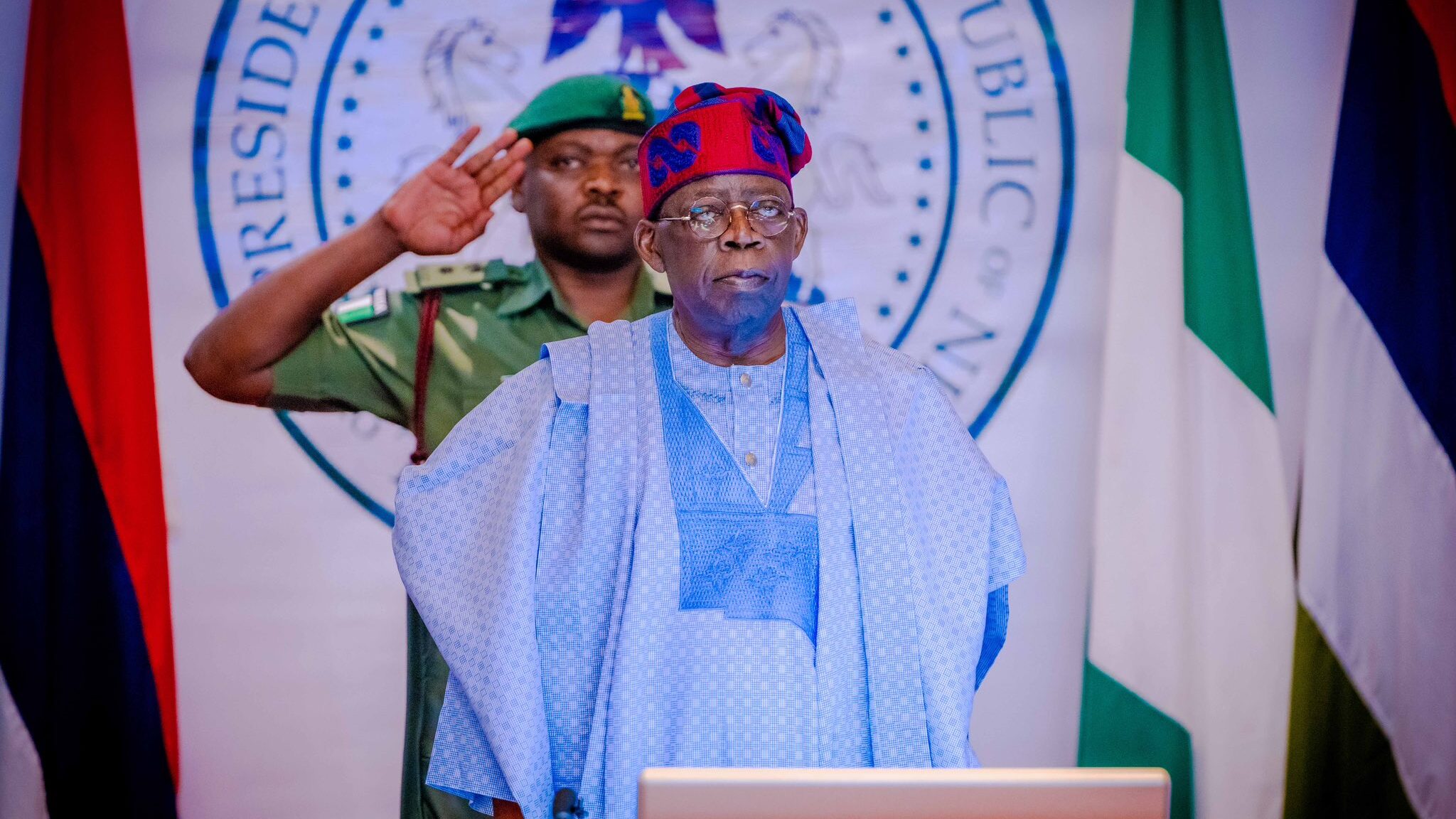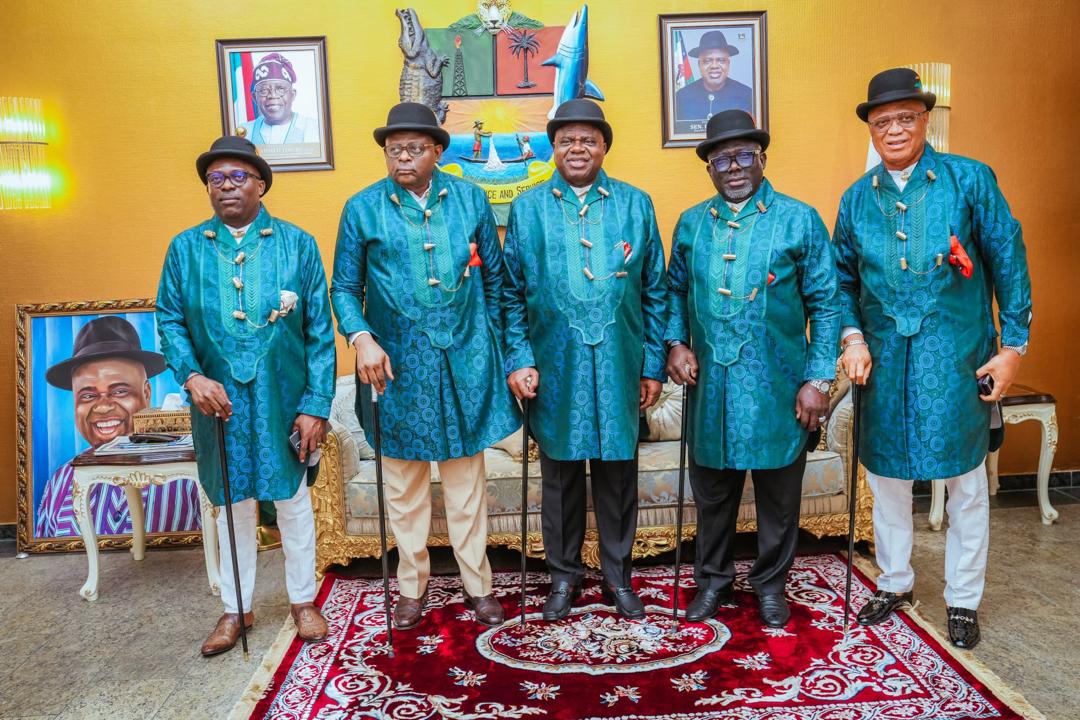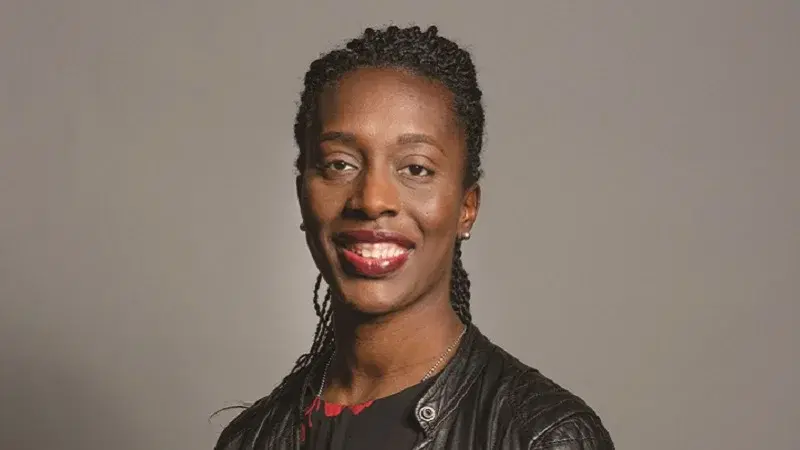News
Economy: I Take Full Responsibility, Nigeria ’ll Recover-Tinubu

President Bola Tinubu, on Wednesday, appealed for patience from Nigerians over the current economic hardship in the country, giving the assurance that there was light at the end of the tunnel.
The President said he was fully aware and took responsibility for the difficulties Nigerians had been subjected to on account of government policies.
He said he would not complain but welcome all criticisms since he was the one who asked to be Nigeria’s President.
The President spoke in Akure, the Ondo State capital, during his visit to the leader of the pan-Yoruba sociopolitical organisation, Afenifere, Pa Reuben Fasoranti.
He also paid a condolence visit to the family of the late former Ondo State Governor, Rotimi Akeredolu, who passed on in December following a protracted battle with cancer.
The fuel subsidy removal and other economic reforms instituted by Tinubu have attracted public censure following the high costs of living, food inflation and other side effects.
The situation compelled the Nigeria Labour Congress to hold a nationwide protest on Tuesday.
The congress also threatened further mass action if the government failed to address the economic crunch within two weeks.
However, addressing public concerns over his economic policies, the President said, “Nigeria will survive the current economic challenges. There is light at the end of the tunnel. I requested the job, and I am not complaining about it. I take full responsibility.”
This was contained in a statement by the Special Adviser to the President on Media and Publicity, Ajuri Ngelale, titled, ‘President Tinubu: I take full responsibility for the nation; we are building an efficient Nigeria that is inclusive and fair to all Nigerians.’’
Tinubu emphasised his commitment to leading Nigeria towards economic and social prosperity, saying, “We are meeting our obligations to the international community. To lenders, we have not defaulted, and we are not going to default. We are navigating the twists and bends on the road to Nigeria’s prosperity.”
On reforming Nigeria, the President said his task would be to ensure fiscal and true federalism, as well as the broad-based manifestation of the philosophy of “what is sauce for the goose is sauce for the gander.”
He acknowledged the understanding and support of all Nigerians in the face of the harsh but temporary economic conditions, assuring them that their patience and perseverance will not be fruitless.
“But, through perseverance, Lagos emerged as the fifth largest economy in the entire continent of Africa. We must manage this moment with wisdom and grow Nigeria responsibly.
“I campaigned for this office to serve Nigeria’s interests and I was elected. Some said I would not last in the tribunal and came up with all sorts of predictions, but even when in court, I remained focused.
“We cannot allow Nigeria’s economy to be exploited. We cannot abandon our economy to marauders. I am determined to re-engineer our finances and curb selfish interests permanently,” he stated.
Speaking on behalf of Afenifere, Pa Olu Falae, a former Secretary to the Government of the Federation, who read the address of Pa Fasoranti, commended Tinubu for his commitment to Nigeria’s progress and expressed support for his administration’s efforts.
“You have kept your word to return to this place where we all prayed for you, and this shows that you are a man of your word,” the elder statesman stated.
Pa Fasoranti asked President Tinubu to be fair and courageous, declaring that such traits were the hallmark of the Afenifere family.
“Today, you are carrying our flag. We are noted for integrity, competence, fairness, and courage. Your performance so far has shown that you understand the full gravity of your mandate, which is to show the Nigerian people that a good government is possible,” he said.
Fasoranti also charged the President on institutional reforms, saying, “Mr President, please also seek institutional reforms that would strengthen our federation and make Nigeria safer and more prosperous. Try and balance the budget and execute capital projects that would create more employment. We thank you for welcoming the idea of state policing.’’
He added, “We want each of the geopolitical zones to have greater responsibilities for security, food production and infrastructural development. Since the removal of fuel subsidy, which was costing Nigeria $10bn yearly, the state governments have been receiving hefty allocations from the Federation account.
“Mr President should persuade the governors to allow this change of fortune for the states to reflect at the grassroots so that life can be better for our people. They should not just buy rice and yams for the people. They should create employment, improve education and build new infrastructures. Today, life is truly challenging for most people and the state governments have an important role to play to transform society.”
Fasoranti received the President in the company of some Afenifere leaders, who included a former governor of Ondo State, Dr Olusegun Mimiko, Chief Sehinde Arogbofa, Deji of Akure, Oba Aladelusi Aladetoyinbo; Chief Kole Omololu, among others
Earlier, the President had paid a condolence visit to Akeredolu’s family in Owo and also visited the palace of the Olowo of Owo Kingdom, Oba Ajibade Gbadegesin Ogunoye III.
Speaking at the palace of the monarch, Tinubu eulogised the late Akeredolu as a statesman and a distinguished legal luminary who served his people with unwavering dedication.
“We lost an illustrious son. Akeredolu was very close to me and an ally. He was a son of the soil, and I have come to pay homage,” the President said.
He extended his prayers for the good health, progress, and prosperity of the traditional ruler and the community and thanked the people of Owo for their support to the bereaved family.
Accompanied by the Governor of Ondo State, Lucky Aiyedatiwa, Tinubu also commiserated with the Akeredolu’s widow, Betty, the children, and other family members.
Addressing the widow and the family members, Tinubu said, “God will be with you. Your children will do well in life. May you all end well. May God be with you and uphold you,”
The wife of the late governor expressed appreciation for the President’s visit, describing Tinubu as a good friend and brother to her late husband.
She also thanked the South-West governors for their contributions to the burial of the late governor. She particularly thanked Governor of Lagos State, Mr Babajide Sanwo-Olu, for single-handedly repatriating the remains of Akeredolu back to Nigeria.
She said, “On behalf of my family, I appreciate Mr. President. We understood he couldn’t attend the burial ceremony due to the dictate of Yoruba culture. He couldn’t have attended the burial of his younger brother.
“Coming today (Wednesday ) is a big deal because we are in a better atmosphere. I also express my profound gratitude to the southern governors for their immense financial contributions to the burial, most especially, Lagos State Governor, Mr Babajide Sanwo-Olu, who singlehandedly brought Aketi’s remains back to Nigeria. We appreciate this huge show of love and we are grateful and forever indebted to him.
“I requested that Mr President see where Aketi has been laid to rest and he followed me. We are deeply grateful to Mr. President for coming. He is indeed Aketi’s brother and friend.
“I told Mr. President, yes, Aketi has left but he lives because he left behind legacies. It is our wish that those legacies continue and are built upon where necessary.”
News
Let’s Approach Regional Development Issues Differently – Fubara …As S’South Govs Host Fubara To 50th Birthday Celebration

Rivers State Governor, Sir Siminalayi Fubara, has sued for a change in the current approach adopted by South South Governors in their pursuit to achieve holistic regional development and economic prosperity.
The governor insisted on de-emphasis in vested individuals’ political interests while looking at the bigger picture of achieving enduring regional integration that will strengthen unity of purpose to change the trajectory of development in the region.
Fubara made the appeal during the meeting of Governors of South-South States, under the auspices of BRACED Commission, at the Bayelsa State Government House in Yanagoa on Tuesday.
This was contained in a statement by the Chief Press Secretary to the Governor, Nelson Chukwudi.
BRACED is an acronym for Bayelsa, Rivers, Akwa Ibom, Cross River, Edo and Delta.
He said: “I want to appeal that if we have to succeed in this drive, we need to keep our political differences aside and understand that the struggle, as at today, is for posterity, for the development of our region.
“It is really sad that in Niger Delta that is the economic base of this country, the construction of a road that you tagged ‘East-West Road’ could be an issue, that we need to beg, protest, and complain to get it fixed. I don’t think it is proper.”
Governor Fubara stated that it is not that the federal authorities do not understand that Niger Delta needs the road but quickly added that they have seen that even the people of the region do not take themselves seriously.
The governor said the moment Niger Delta people stopped playing to the gallery, and place value on themselves, outsiders will have no option than to accord the region and its people due regard.
Fubara said: “On my part, I want to say this: This is not the first time we are meeting. For me, I followed the course of the region meeting in a forum that we tagged “BRACED Commission.”
“BRACED Commission is also one of the bodies that was constituted at that time to support and work out development strategies for this region. But what I am seeing today is just limiting this meeting to only BRACED COMMISSION.
“We need to widen the scope where other leaders of the region should be part of the discussion of the development of the region, and I think this is the direction that will help the region.”
Reading the Communique of the meeting, the new Chairman of the Forum of Governors of South-South States, and Governor of Bayelsa State, Senator Douye Diri, said they support the Federal Government Tax Reform Bills, and urged President Bola Tinubu to extend the Value Added Tax (VAT) sharing percentages to oil and gas derivation.
He stated the Forum’s request to the Federal Government to urge relevant stakeholders and agencies to extend remediation of polluted environment ongoing in Ogoni land to other impacted communities and States in the region.
Governor Diri also said that the Forum resolved to establish a structural regional security network to enhance safety and security, foster stable Niger Delta region conducive for economic growth and prosperity.
Highlight of the event was the hosting of Governor Fubara to a surprise 50th Birthday celebration by the Governors of South-South States at the Government House in Yenagoa.
News
Fubara Lauds Tinubu For Setting Up Education Load Fund … Vows To Ensure Rivers Benefit Maximally From Scheme

The Rivers State Government has applauded President Ahmed Bola Tinubu for conceiving the idea of setting up the Nigeria Education Loan Fund (NELFUND) which has opened up opportunities for youths to acquire tertiary education irrespective of their financial status.
Rivers State Governor, Sir Siminalayi Fubara, gave the commendation while playing host to a delegation from NELFUND who came on an advocacy visit to the Government House in Port Harcourt on Tuesday.
Represented by his deputy, Prof. Ngozi Nma Odu, Governor Fubara said in developed countries it is common for people to go through school with loans which they sometimes pay all throughout their lives, noting that “for us, it is more accessible and more friendly because you would be required to pay back the loan two years after your National Youth Service.
“It is a win-win situation; it is a situation where the youths in Nigeria should not say because my parents are poor or passed away I cannot improve on my educational growth. This offers them a golden opportunity and I am glad you came for this advocacy.”
The governor urged NELFUND to intensify its advocacy to let the people know how they can benefit from it, adding that it is more important when talking about vocational institutions.
“If you look at the developed countries it is people that went to the vocational schools that make so much money, because it is pricey to get somebody to do anything, we need to instil this into our people, our youths, because people sometimes tend to look down on people that went to vocational schools, it should not be,” he said.
Fubara expressed delight with the NELFUND programme and assured that the State Government would do whatever it can to ensure Rivers State benefits maximally from the scheme.
In his remarks, the Managing Director and Chief Executive of NELFUND, Dr. Akintunde Sawyer, informed the governor that they were in Rivers State to seek the support of the State Government towards the loan, stressing that President Tinubu has directed them to ensure no Nigerian student who has the ability and desire to get educated at tertiary level is denied the opportunity due to lack of funding.
He explained that the scheme provides interest-free loans to students who apply, adding that these loans are not repayable until two years after their Youth Service when they must have gotten a job.
News
UK Appoints British-Nigerian As Trade Envoy To Nigeria

A British-Nigerian politician, Florence Eshalomi, has been appointed as the United Kingdom’s trade envoy to Nigeria.
Her appointment makes Eshalomi the second Nigerian to hold the position.
Confirming her appointment on X on Tuesday, she wrote: “It is an honour to have been appointed as the United Kingdom’s Trade Envoy to Nigeria.
“I’m looking forward to building on my close ties with Nigeria to promote a strong and flourishing economic relationship between our two great nations.
“I am looking forward to strengthening the UK’s relationship with Nigeria to explore shared growth and opportunities for both countries.”
Announcing the appointment in a statement on Tuesday, Jonathan Reynolds, the UK’s Business and Trade Secretary, said the decision was aimed at attracting investment into the UK and boosting economic growth.
“I’ve launched a new team of trade envoys who will use their experience, expertise, and knowledge to unlock new markets around the world for British businesses, attract investment into the UK, and ultimately drive economic growth,” Reynolds said.
Eshalomi, 44, is an MP representing the Vauxhall and Camberwell Green constituency.
She holds a Bachelor of Arts (Hons) in Political and International Studies with Law from Middlesex University.

